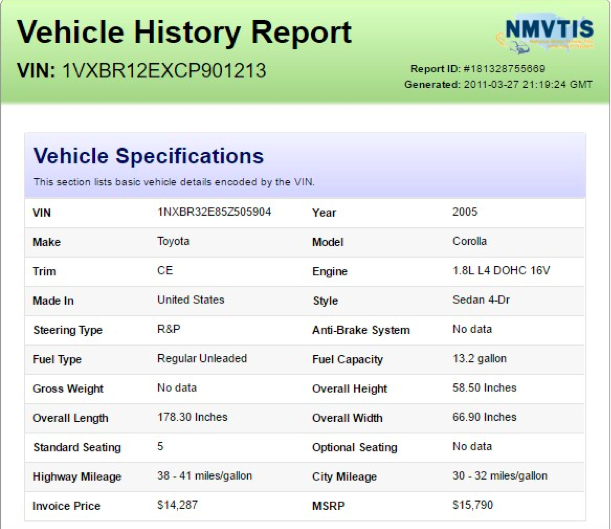One of the most memorable and prestigious moments is the day you get to buy a new vehicle, whether it is a car or a two-wheeler. Having your name registered as the legal owner of the car fulfills some of the wildest imaginations of most people. However, this feeling is always accompanied by an element of responsibility as you have to meet all the legal requirements to drive without breaking any law whatsoever. Failure to have your vehicle registered might draw hefty fines or even a jail term in default.
Another problem has been in acquiring a vehicle registration number (VIN) whereby one may fail to distinguish a fake number from an original one. When such mistakes occur, it may attract court cases and other accruing crimes. That is the reason why one should be in a position to differentiate between a fake and original VIN history report, as has been discussed herein.

What is a VIN?
This is a distinguishing number such as motor number or serial number that identifies a vehicle or its other parts for different reasons such as registration or tracking. Moreover, it can also be used to track whether an insurance policy covers that particular car.
The VINs are mostly stamped in visible places such as on the inside of the door, the dashboard, engine, and many other places. This number is very vital, and illegal alterations may lead to violation of some laws.
Crimes that are commonly associated with VIN
There are three main crimes related to your car’s VIN. The first one is intentionally altering or destroying the VIN. This is a misdemeanor crime that outlaws the change or destruction of VIN in either the car or its parts. However, this does not apply to manufacturers as they are allowed by law to make changes.
The second crime is buying or having a vehicle whose VIN is altered. This law ensures that the flow of stolen cars and spare parts into the country does not happen.
Lastly, we have other related crimes, such as receiving stolen goods or forgery.
How to check your VIN to ensure that it is original
People have made previous mistakes of entirely relying on car dealers and brokers. If you are buying a 2nd hand car, you should employ extra caution in your dealings. This is because you might be short changed through forged documents to deceive you on the car’s originality.
To avoid all these problems, one can check the vehicle’s identification number through the authorized platforms. This will be the safest way of establishing whether a used car is legit or not. You can get such vital information from car manufacturers and vehicle registration agencies.
These institutions carry out databases of the VINs and will identify and validate the car by simply keying in the number. You can also visit a reputable agency where you check license plate and get vehicle history report for free. If you use fake agencies, some irregularities show up, and it shows that the vehicle’s history is unclear, and the deal might be contaminated after all. At this time, one is expected to walk away regardless of how good the deal was.
How to detect fake history reports
Most of the false reports come from scammers’ links that steal from unsuspecting car owners. In most cases, a buyer may want to see a history report before making the purchase. The problem comes in when you want to sell the car online. Scammers send their target a link where they purport to buy a history report at a lower price. Most individuals fall victim to such and may end up purchasing fake reports in the name of saving a few bucks.
Many websites claim that they sell history reports at a small fee. Unfortunately, most of these sites are fake, and they end up selling counterfeit documents to unsuspecting people. The best way to ensure that the agency is legitimate is by ensuring they have an affiliate program. Moreover, you can avoid all the scamming by purchasing car history reports from only a reputable agency.
Differentiating between a fake and original VIN history report can be quite hectic, and it only requires verification from an authorized government or private agency. People should not take the risk of assuming that every history report presented to them is original since a lot of people are here to mince money out of unsuspecting people. It is therefore recommended that one makes a personal inquiry from a reputable agency instead of relying on an uncertified document.



































